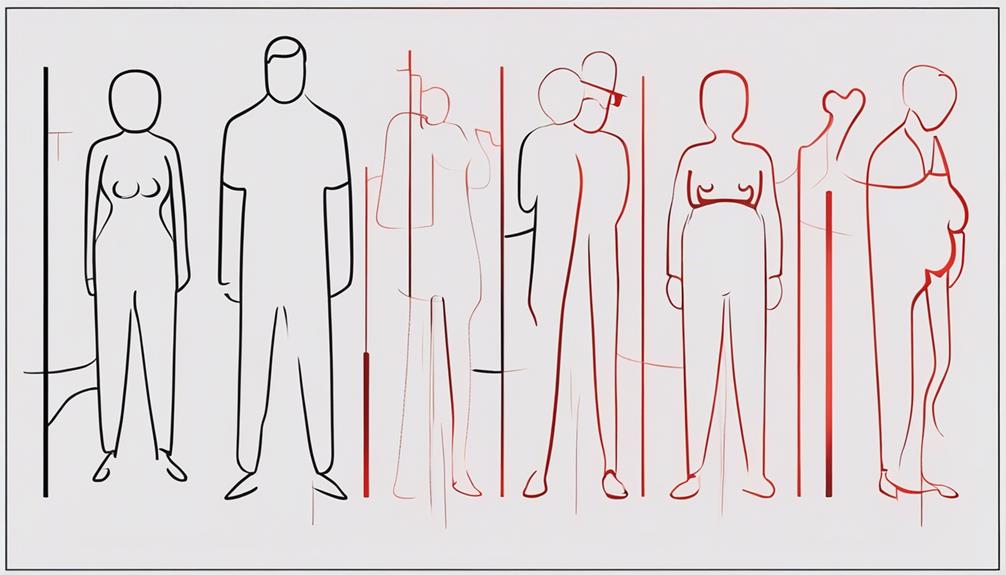If you've noticed a coworker experiencing unexplained weight loss despite no changes in their diet or exercise routine, it might be a sign of something more serious.
But what else could be going on beneath the surface?
Symptoms of type 1 diabetes in adults can often be subtle, making them easy to overlook.
Stay tuned to uncover the signs that may indicate a deeper health issue at play.
Key Takeaways
- Frequent urination and extreme thirst are common symptoms.
- Unexplained weight loss and fatigue may indicate Type 1 Diabetes.
- Blood sugar management is crucial for controlling thirst and hunger.
- Regular eye exams are essential for monitoring blurry vision risks.
Early Warning Signs

If you experience frequent urination, extreme thirst, or unexplained weight loss, these could be early warning signs of Type 1 Diabetes in adults. Late diagnosis of Type 1 Diabetes in adults isn't uncommon, as the symptoms can sometimes be subtle and easily attributed to other causes. The misdiagnosis risk is particularly high due to the overlap of symptoms with other conditions, leading to delays in receiving the appropriate treatment.
Frequent urination, known as polyuria, occurs because high blood sugar levels lead to increased urine production by the kidneys. This excessive urination can result in dehydration, triggering extreme thirst, or polydipsia. Unexplained weight loss is often a consequence of the body breaking down muscle and fat for energy when it can't properly utilize glucose from the blood.
It is crucial to seek medical attention promptly if you're experiencing these early warning signs to prevent a late diagnosis and the associated complications of uncontrolled Type 1 Diabetes.
Unexplained Weight Loss
Unexplained weight loss in adults with Type 1 Diabetes is often a result of the body breaking down muscle and fat for energy due to the improper utilization of glucose from the blood. When the body can't effectively use glucose for energy due to inadequate insulin, it turns to alternative sources, leading to weight loss. This weight loss may occur even if you're eating normally or even more than usual.
Unexplained fatigue is another common symptom that may accompany weight loss in adults with Type 1 Diabetes. The body's inability to properly utilize glucose can leave you feeling tired and lacking in energy. This fatigue can be debilitating and affect your daily activities.
Increased urination is also linked to unexplained weight loss in Type 1 Diabetes. The excess glucose in your blood pulls fluids from your tissues, leading to frequent urination. This can contribute to dehydration and further exacerbate feelings of fatigue and weight loss. If you're experiencing unexplained weight loss along with fatigue and increased urination, it's essential to consult a healthcare provider for proper evaluation and management.
Extreme Thirst and Hunger

Extreme thirst and hunger are common symptoms experienced by adults with Type 1 Diabetes, often attributed to the body's inability to regulate blood sugar levels effectively. When blood sugar levels aren't controlled due to insufficient insulin production, your body may send signals of intense thirst and hunger. These symptoms can be distressing but are crucial indicators that prompt you to seek medical attention.
Here are some key points to help you better understand extreme thirst and hunger related to Type 1 Diabetes:
- Intense Thirst: You may find yourself drinking more fluids than usual as your body tries to flush out excess sugar through urine.
- Constant Hunger: Despite eating, you may still feel unsatisfied and crave more food due to the inability of your cells to absorb glucose.
- Weight Changes: Unexplained weight loss or gain can occur as a result of fluctuating blood sugar levels affecting your metabolism.
- Frequent Urination: Excessive thirst often leads to increased urination, disrupting your daily routine.
- Blood Sugar Monitoring: Regularly monitoring your blood sugar levels helps in managing these symptoms effectively.
Fatigue and Weakness
Fatigue and weakness are commonly reported symptoms in adults with Type 1 Diabetes, indicating potential fluctuations in blood sugar levels affecting your energy levels. When your blood sugar isn't well-managed, you may experience persistent fatigue and weakness that can interfere with your daily activities. To address these symptoms effectively, consider making dietary changes and incorporating an exercise routine into your daily life.
Ensuring a balanced diet that includes complex carbohydrates, lean proteins, and healthy fats can help stabilize your blood sugar levels and combat fatigue. Avoiding sugary foods and opting for whole grains, fruits, and vegetables can provide sustained energy throughout the day. Additionally, regular physical activity can improve your body's sensitivity to insulin, allowing for better blood sugar control and increased energy levels.
Blurry Vision

Experiencing blurry vision can be a common symptom for adults with Type 1 Diabetes, indicating the need for immediate attention to manage your condition effectively. Changes in your vision should never be ignored, especially if you have been diagnosed with Type 1 Diabetes. Blurry vision could be a sign of fluctuating blood sugar levels affecting your eye health and visual impairment.
Here are five crucial points to consider:
- Regular eye exams are essential for individuals with Type 1 Diabetes to monitor any changes in vision promptly.
- High blood sugar levels can cause temporary changes in the shape of your eye lenses, leading to blurry vision.
- Untreated visual impairment in diabetes can progress to more severe conditions like diabetic retinopathy.
- Managing your blood sugar levels through proper medication, diet, and exercise can help improve blurry vision.
- Seek immediate medical attention if you experience sudden or severe blurry vision, as it could be a sign of a more critical eye issue related to your diabetes.
Frequently Asked Questions
Can Type 1 Diabetes Develop Later in Life, or Is It Typically Diagnosed in Childhood?
Late onset of type 1 diabetes can occur in adulthood, leading to potential misdiagnosis due to its association with childhood. Symptoms like increased thirst, frequent urination, and unexplained weight loss may manifest in adults.
Are There Any Specific Dietary Recommendations for Managing Type 1 Diabetes in Adults?
Like a chef crafting a masterpiece, managing type 1 diabetes in adults involves careful dietary restrictions and precise meal planning. Embrace this culinary challenge to nourish your body and maintain optimal health.
How Often Should Adults With Type 1 Diabetes Monitor Their Blood Sugar Levels?
To manage your type 1 diabetes effectively, monitor your blood sugar levels regularly. Incorporate lifestyle changes, embrace insulin therapy, and utilize technology for better control. Consult with healthcare professionals to determine a personalized monitoring schedule that suits your needs.
Are There Any Unique Challenges That Adults With Type 1 Diabetes Face Compared to Children or Adolescents With the Condition?
You face unique challenges with type 1 diabetes as an adult. Support groups offer emotional aid. Coping strategies help manage stress. Workplace accommodations may be needed. Social stigma can impact mental health. Seek help and resources for better management.
Can Stress or Other Emotional Factors Worsen Symptoms of Type 1 Diabetes in Adults?
Feeling overwhelmed? Remember, stress can impact your type 1 diabetes. Prioritize stress management and find coping mechanisms. Seek emotional support and explore therapy options. Taking care of your mental health can positively influence your diabetes management.
Conclusion
In conclusion, it's important for adults to be aware of the symptoms of type 1 diabetes in order to seek prompt medical attention.
One interesting statistic to note is that approximately 1.6 million Americans have type 1 diabetes, with about 40,000 new cases diagnosed each year.
Recognizing the early warning signs such as unexplained weight loss, extreme thirst, fatigue, and blurry vision can lead to timely diagnosis and management of this chronic condition.
Stay informed and proactive about your health.